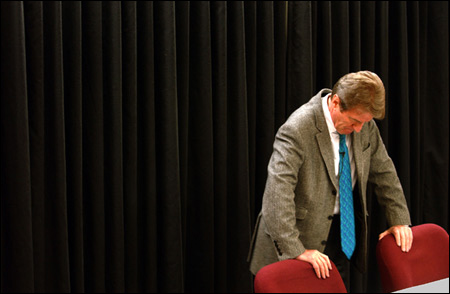Kouchner: Iraqi voices remain unheard:
People are the silent players amid all the talk

Calling himself a traitor to France’s peaceful position on Iraq, yet not on board for America’s looming war, Doctors Without Borders founder Bernard Kouchner said it is the Iraqi people – machine-gunned, gassed, and murdered by the hundreds of thousands – who are forgotten in the debate. To view an on-demand video Webcast of this event, visit http://www.hsph.harvard.edu/iraq/webcast.html.
Kouchner, a visiting professor at the Harvard School of Public Health and a fellow at the François-Xavier Bagnoud Center for Health and Human Rights, squarely straddled the line between war and peace Friday (March 14) during a speech before several hundred in a packed Snyder Auditorium.
“Nobody is taking into account the Iraqi people. They are the only ones who can say yes or no to the war,” said Kouchner, who has also served as France’s minister of health and as the United Nation’s administrator of post-intervention Kosovo. “I am not supporting Mr. Bush, I am not supporting [French President Jacques] Chirac. I will support to the end of my days the victims, and they are the Iraqi people.”
Kouchner, in a talk called “Iraq: The International Dilemma,” made a convincing case for the ouster of Iraqi dictator Saddam Hussein. He described Hussein’s brutality toward his own people in anecdotes culled from Doctors Without Borders’ years of working in the Middle Eastern nation.
Kouchner described victims of the 1988 Iraqi gas attacks on Kurdish villages, the piles of bodies left after Iraqi troops machine-gunned a crowd from helicopters, and described the continuing stream of refugees from razed villages in Hussein-controlled Iraq into the independently run Kurdish zone in the north.
“Still they’re suffering and they have not been taken into account,” Kouchner said of the chemical attack victims from Halabja in northern Iraq.
Despite the ongoing brutality, however, Kouchner said he also knows the brutality that war brings and said he does not support an American war on Iraq. He criticized both sides in the ongoing international debate, saying there is a small window of time in which to avoid war, but only if international powers begin to work together.
Kouchner said it is still possible to force Hussein from power, given the ever-tightening noose of American military force. That could be used to expand the no-fly zones in Iraq’s north and south, coupled with increased aid to the Iraqi people and unified international pressure.
But even Kouchner didn’t seem hopeful that would happen. He repeated his opposition to war several times in his half-hour speech and during a subsequent question-and-answer session. Yet even as he said the Iraqi people’s voices should be considered, he also said he’s sure some would approve of their nation being bombed if it meant being rid of Hussein.
“I know some of them will accept the bombing. They have a right to say so and be delivered,” Kouchner said. “I believe that thousands and thousands of Iraqis are waiting for deliverance.”
Kouchner was also critical of peace protests, saying he supported their goals but that they were forgetting Hussein’s brutality. He counseled protesters to include anti-Hussein slogans among their banners and signs in the future.
The questions following the speech explored different facets of the Iraq debate, with one School of Public Health faculty member saying he thought Kouchner was “being used” by those who support a war in Iraq. The aim of supporters of the war, said James Robins, professor of epidemiology and biostatistics, is not to help the Iraqi people, but to redraw the Middle East’s geopolitical map.
Kouchner also handled a question about America’s thirst for Iraqi oil, saying though there may be some interest in Iraqi oil fields, he didn’t believe the problem was that simple. Oil, he said, doesn’t explain a similar American intervention in Kosovo, which has no oil. It also doesn’t take into account the deep shock to the American psyche done by the Sept. 11 terrorist attacks.
Two Iraqi expatriates also spoke, one thanking Kouchner for finally bringing the Iraqi people’s voice into the debate and the second saying Kouchner’s “No to Saddam, and no to war” stance was really no stance at all.
“You cannot have it both ways; you have to say we have to remove Saddam Hussein,” said Harvard Medical School Assistant Professor Jamil Kirdar. “There is no alternative to this war.”
Saddam should have been dealt with, Kouchner said, after the first Gulf War, but instead the withdrawal of international forces when the Iraqi people were ready to rise up amounted to supporting Hussein’s repression of dissent.
“It should have been done years and years before,” Kouchner said. “We were stupid. No, we were not stupid, we were guilty of complicity.”
The voice of the Iraqi people, though not heard so far, is beginning to be raised, he said. British Prime Minister Tony Blair has been talking about human rights in Iraq, Kouchner said, and stories from Iraqis have begun reaching France.
“The French opinion is going to change. It is changing already,” Kouchner said.




